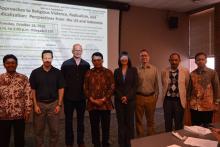Senior lecturer Desiana Pauli Sandjaja organized a symposium entitled “Approaches to religious violence, radicalization, and deradicalization: Perspectives from US and Indonesia” on October 18th, 2016 at the UW Seattle campus. This event was co-sponsored by the Department of Asian Languages and Literature, the Southeast Asia Center, and the Indonesian Consulate General of San Francisco.
The event started with opening remarks delivered by Prof. Paul Atkins, the Chair of the Department of Asian Languages and Literature, followed by a speech from The Hon. Indonesian Consul General, Mr. Ardi Hermawan.
This event drew over 50 people from diverse backgrounds, including undergraduate and graduate students from UW and other universities in the greater Seattle area, professors, student organizations, peace and social justice activists, and community members.
The symposium aimed to analyze the roots of religious violence and find ways to mitigate the issues. The first panel presented 3 speakers: Prof. James Wellman (UW, Comparative Religion) “A Theory of Religious Violence across Time and Tradition”; Prof. Muhammad Ali (UC Riverside, Religious Studies Department) “Deradicalization and Disengagement Approaches against Extremist Violence in Contemporary and Pluralistic Indonesia”; and Prof. Mark Smith (UW Political Science) “The Trajectory of Violence in Christianity and Islam.”
The second panel focused on ways to mitigate the issues of religious violence. There were presentations by three speakers: Prof. Muhammad Wildan (State Islamic University of Sunan Kalijaga, Indonesia) “The Impact of Globalization on Re-Islamization and the Role of Islamic Higher Education in Re-mainstreaming Indonesian Muslims”; Prof. Gareth Barkin (University of Puget Sound, Anthropology and Asian Studies) “Commercial Islam in Indonesia: How Television Producers Mediate Religiosity among National Audience”; and Prof. Tonny Pariela (University of Pattimura, Department of Sociology, Indonesia) “Inter-religious Violence and Peace-making Effort through the Local Awareness of ‘Katong Orang Basodara’ (We are brothers) in Maluku, Indonesia.”
